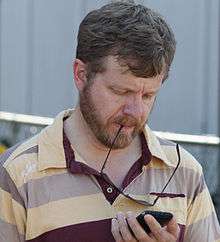Scott Sehon
Scott Robert Sehon (born 1963) is an American philosopher and a professor of philosophy at Bowdoin College. His primary work is in the field of philosophy of mind, metaphysics, epistemology, philosophy of action, and the free will debate. He is the author of Teleological Realism: Mind, Agency and Explanation (MIT University Press, 2005) in which he takes a controversial, non-causalist view of action explanation.[1][2] Sehon has also published in the area of Philosophy of Religion, with a particular focus on the problem of evil[3] and whether or not religious faith is a necessary foundation for morality.[4]
Scott R. Sehon | |
|---|---|
 | |
| Born | November 25, 1963 |
| Nationality | American |
| Alma mater | Princeton University Harvard University |
| Scientific career | |
| Fields | Philosophy Philosophy of mind Metaphysics Free will |
| Institutions | Bowdoin College |
Sehon received his B.A. in philosophy from Harvard University, where he worked with Warren D. Goldfarb, and earned a Ph.D. in philosophy at Princeton University, where he worked with Mark Johnston and Harry Frankfurt. His thesis was titled: "Action Explanation and the Nature of Mental States."
Notes
- See Carol Slater's review in Psyche, http://www.theassc.org/files/assc/2662.pdf
- See Carl Ginet's review in Philosophy and Phenomenological Research, http://onlinelibrary.wiley.com/doi/10.1111/j.1933-1592.2008.00171.x/abstract;jsessionid=F68FC7CEB981778619CF5894975E5A13.d02t03
- Scott Sehon, "The Problem of Evil: Skeptical Theism Leads to Moral Paralysis" http://philpapers.org/rec/SEHTPO
- What Does it Mean to be Good? Two Scholars, Christian and Secular, Share Their Views, http://vimeo.com/23273288
Bibliography
- Teleological Realism: Mind, Agency and Explanation. MIT University Press, 2005
- Action Explanation and The Free Will Debate: How Incompatibilist Arguments Go Wrong, Philosophical Issues, Vol.22, No. 1: 351-368.
- A Flawed Conception of Determinism in the Consequence Argument. Analysis 71 (1):30-38.
- Teleology and Degrees of Freedom, Internationale Zeitschrift für Philosophie, Volume 17:1 (2008): 123-144
- An Argument Against the Causal Theory of Action Explanation, Philosophy and Phenomenological Research, 60:1(2000): 67-85
- Connectionism and the Causal Theory of Action Explanation, Philosophical Psychology, 11:4(1998): 511-531
- Natural-Kind Terms and the Status of Folk Psychology, American Philosophical Quarterly, 34:3(1997): 333-344
- Deviant Causal Chains and the Irreducibility of Teleological Explanation, Pacific Philosophical Quarterly 78:2 (1997): 195-213
- Teleology and the Nature of Mental States, American Philosophical Quarterly, 31 (1994): 63-72
- Dementors, Horcruxes, and Immortality: The Soul in Harry Potter,” in Harry Potter and Philosophy: Hogwarts for Muggles, William Irwin and Gregory Bassham, eds. Wiley (2010).
- “Teleological Explanation,” in Blackwell Companion to Philosophy of Action, Timothy O’Connor and Constantine Sandis, eds. Blackwell. (2010).
Interviews with Scott Sehon
- Audio Interview with Scott Sehon on Common Sense Atheism.com
- What Does it Mean to be Good? Two Scholars, Christian and Secular, Share Their Views, The Veritas Forum
External links
- Scott Sehon's faculty web page
- Works by Scott Sehon at Philpapers.org
- Review of Teleological Realism in Notre Dame Philosophical Reviews
- Review of Teleological Realism in Metapsychology Online Book Reviews